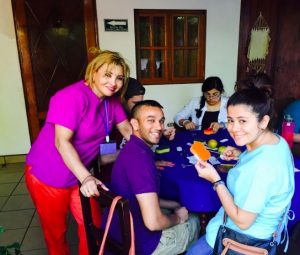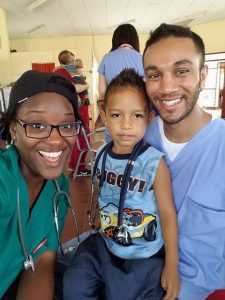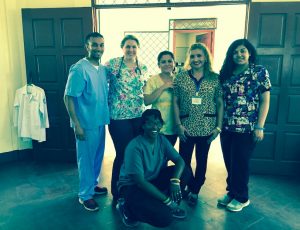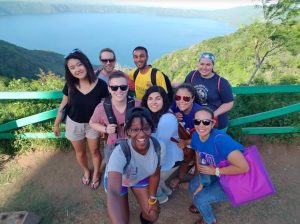After the experience of a lifetime, traveling with ISL and volunteering in Nicaragua, volunteer Milan Sheth has joined our team of Ambassadors to continue sharing ISL’s mission to serve those in need. We touched base with Milan recently to get some insight into what it is about Global Learning that inspires him:
How did you learn about International Service Learning?
Currently, I am a graduate student in Eastern Mennonite University’s (EMU) M.A. Biomedicine program. Our program’s curriculum integrates a cross-cultural component, which enables students to gain experience and exposure to international health and volunteer opportunities abroad. Dr. Ann Hershberger leads the cross-cultural course; she introduced ISL to the Biomedicine program a few years ago. EMU and ISL have formed a close connection, and students continue to have life-changing experiences.
What program did you choose and why?
I chose to participate in ISL’s Global Health program in Nicaragua. I understand there is a shortage of healthcare professionals in underdeveloped countries. The Biomedicine program presented an opportunity that allowed me to volunteer and serve medically underserved populations. ISL and the Biomedicine program that have similar philosophies with an interdisciplinary approach to healthcare. I enjoyed applying what I learned in the classroom to real life situations. ISL trained volunteers with basic clinical skills that they used during patient visits.
What did you do to prepare for your trip abroad?
I communicated with my peers who had previous international experience; I asked them questions on what to expect. Individuals who have first-hand knowledge based on prior experiences are a valuable resource. Many of the students in the Biomedicine program traveled to Nicaragua and provided great insight. Also, my cross-cultural course held orientation prior to departing for Nicaragua. During orientation, our professor assigned literature that helped me gain a perspective on how to treat and relate to patients. In addition, I read ISL’s welcome packet and reviewed basic Spanish and medical terminology. Sagen Eatwell, an ISL Volunteer Experience Coordinator, and I were in correspondence throughout the entire process, and he helped every step of the way.
What was your favorite activity in Nicaragua?
My favorite activity in Nicaragua was interacting with the children and older adults during clinic days. Every individual welcomed our group with a smile. I recall visiting a primary school in San Isidro where children approached us; they were intrigued and fascinated by the work we were doing. Many of us played soccer and danced with the children and adults during “community share” days. I found it remarkable how appreciative every resident was with each medical professional as well as the resident’s receptiveness to the advice. These interactions brought great joy and solidified my purpose of pursuing a career in medicine.
How would you describe your experience working with medical professionals in Nicaragua?
Our team consisted of 3 trained medical professionals (2 physicians and 1 dentist). I was amazed by the amount of knowledge each professional shared during our seminars. The physicians took a “hands-on” approach during seminars and were invested in our success. Doctora Rueda, Ramirez, and Hernandez were extremely patient and explained concepts in a simplistic manner. We were very fortunate and had the opportunity to visit Hospital Antonio Lenin Fonseca. A prominent neurosurgeon, Dr. Caceres, guided us through the ICU, surgery wing, and emergency room. I will never forget the message Dr. Caceres relayed to us, “We may not have state-of-the-art equipment or all of the necessary resources, but we find a way to get things done.” I found this to be a powerful statement because it was apparent how dedicated each medical professional was by the time they invested in their patients. I found medical professionals in Nicaragua to be extremely motivated; they seek medical training opportunities abroad so they can provide the best treatment of care for their patients. I learned a great deal by checking vital signs to understanding the sacrifices that are necessary to be successful in a health profession.
What was your greatest take-away from your experience with ISL?
My greatest take-away from the ISL experience was the importance of being humble and giving back to those in need. I grew in my cultural competence and appreciated the life skills that I acquired. I have a newfound interest in global health and plan to participate in future educational opportunities. Our group was relatively small, but the friendships and relationships I created with my peers and team leaders will last a lifetime. My trip to Nicaragua was one for the books!
What advice would you give to someone considering going on an ISL program?
I would advise individuals to keep an open mind and to be willing to try new food, activities, and immerse yourself within a new culture. It is important to be respectful to the people of the host country and the medical personnel who lead the groups. For those of you traveling to Spanish-speaking countries, it is not mandatory, but try to brush up on basic medical terminology and phrases in Spanish. This will be beneficial during clinic days!
Where will you go next?
I am serving as an ISL ambassador, which will allow me to stay connected with the ISL community. Upon graduating from EMU’s M.A. in Biomedicine program, I intend to work in healthcare and apply to medical school. My newfound interest in global health will always keep me involved!




